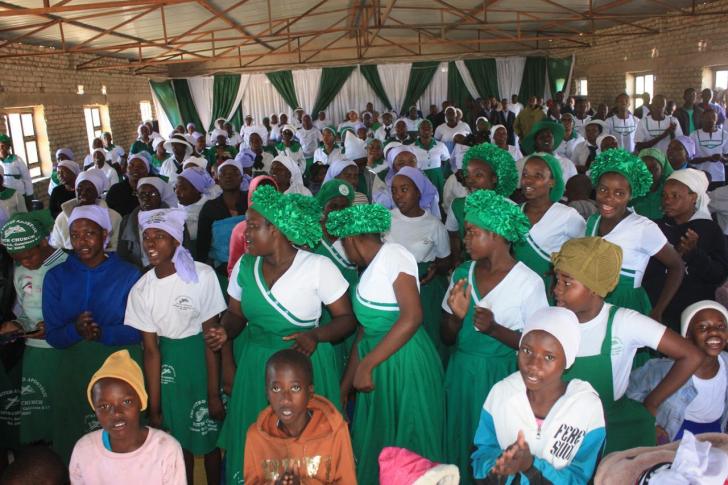News / National
Indigenous Churches Pledge Support in Combating Road Carnage, Child Marriages, and Drug Abuse
13 Aug 2025 at 22:56hrs |
0 Views

HARARE - Indigenous churches have pledged to support government efforts to reduce road accidents, end early child marriages, and combat drug abuse, citing their ethical, moral, and spiritual responsibility to safeguard lives.
Speaking during a weeklong women's fellowship, thanksgiving, and stakeholder engagement conference, Bishop Wine Chiteto of The United Apostolic Faith Church (TUAFC) emphasised the role of clergy in promoting moral governance and addressing societal challenges.
"Despite the government's tireless efforts to curb road carnage, churches must actively complement these campaigns through genuine engagement with communities," said Bishop Chiteto. "We have a spiritual and moral duty to ensure lives are saved."
She urged church leaders to discourage night travel after mass gatherings, citing fatigue and poor visibility as contributing factors to accidents. "We should encourage members to leave early and rest at designated lay-bys rather than pushing drivers beyond safe limits," she added.
Vice General Samkeliso Tshuma echoed the call for safer transport practices, urging churches to engage certified transporters and use roadworthy vehicles. "We need to prioritise compliance with traffic regulations and seek training for our transport teams to reduce accident risks," Tshuma said.
Apostle Edmore Makotore appealed to authorities such as the Traffic Safety Council of Zimbabwe to train ambassadors within indigenous churches. "We need traffic safety officers to engage with our congregations during gatherings and help spread awareness," he said.
Makotore also highlighted the dangers of hiring unregulated transporters, some of whom may drive under the influence of alcohol. "Churches must also take a stand against drug and substance abuse, which contributes to societal decay," he added.
Archbishop Busani Sibanda, founding leader of TUAFC, called for psychological and spiritual assessments of transporters before engagement. "Accidents can stem from socio-economic stress or spiritual afflictions. Churches must be equipped to discern and counsel accordingly," Sibanda said.
He further emphasised the need to empower youth through training and incentives to combat drug abuse and uphold cultural values.
Meanwhile, six-year-old Ivainashe Makotore delivered a poetic tribute to Zimbabwe's national heroes - both living and late - including President Emmerson Mnangagwa - for their role in securing freedom of worship for indigenous churches.
Speaking during a weeklong women's fellowship, thanksgiving, and stakeholder engagement conference, Bishop Wine Chiteto of The United Apostolic Faith Church (TUAFC) emphasised the role of clergy in promoting moral governance and addressing societal challenges.
"Despite the government's tireless efforts to curb road carnage, churches must actively complement these campaigns through genuine engagement with communities," said Bishop Chiteto. "We have a spiritual and moral duty to ensure lives are saved."
She urged church leaders to discourage night travel after mass gatherings, citing fatigue and poor visibility as contributing factors to accidents. "We should encourage members to leave early and rest at designated lay-bys rather than pushing drivers beyond safe limits," she added.
Vice General Samkeliso Tshuma echoed the call for safer transport practices, urging churches to engage certified transporters and use roadworthy vehicles. "We need to prioritise compliance with traffic regulations and seek training for our transport teams to reduce accident risks," Tshuma said.
Apostle Edmore Makotore appealed to authorities such as the Traffic Safety Council of Zimbabwe to train ambassadors within indigenous churches. "We need traffic safety officers to engage with our congregations during gatherings and help spread awareness," he said.
Makotore also highlighted the dangers of hiring unregulated transporters, some of whom may drive under the influence of alcohol. "Churches must also take a stand against drug and substance abuse, which contributes to societal decay," he added.
Archbishop Busani Sibanda, founding leader of TUAFC, called for psychological and spiritual assessments of transporters before engagement. "Accidents can stem from socio-economic stress or spiritual afflictions. Churches must be equipped to discern and counsel accordingly," Sibanda said.
He further emphasised the need to empower youth through training and incentives to combat drug abuse and uphold cultural values.
Meanwhile, six-year-old Ivainashe Makotore delivered a poetic tribute to Zimbabwe's national heroes - both living and late - including President Emmerson Mnangagwa - for their role in securing freedom of worship for indigenous churches.
Source - Byo24News
Join the discussion
Loading comments…





























